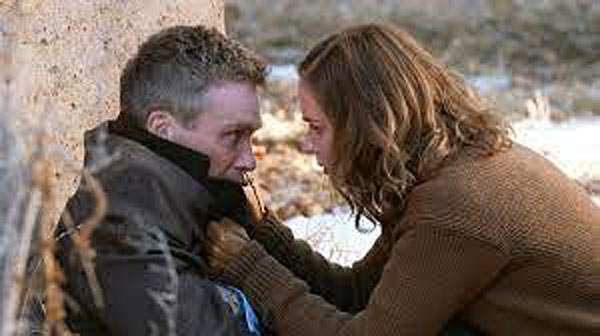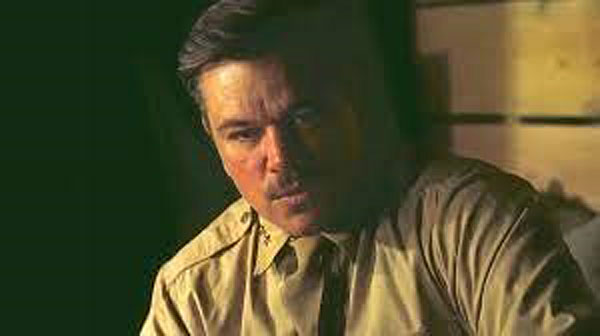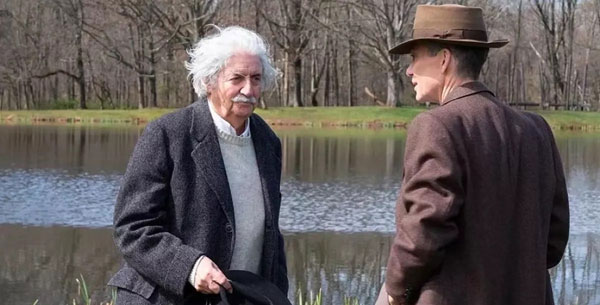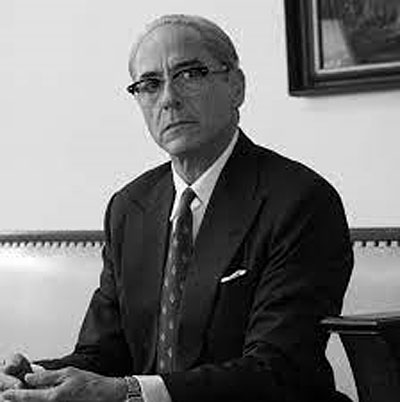That civilization may not sink,
Its great battle lost,
Quiet the dog, tether the pony
To a distant post.
Our master Caesar is in the tent
Where the maps are spread,
His eyes fixed upon nothing,
A hand under his head.
Like a long-legged fly upon the stream
His mind moves upon silence.
—William Butler Yeats, "Long-Legged Fly"
The
irony of J. Robert
Oppenheimer's life is
that, in order to save
the world, he had to
lead the effort to
create a device that
could destroy
it. That this
irony weighed on him
heavily is the main
point—though not
the only
point—of
Christopher Nolan's Oppenheimer, which he based on American Prometheus, the
Oppenheimer biography
by Kai Bird and Martin
J. Sherwin.
My Scene4 colleague
Patrick Walsh has
already written an
excellent column about
the history behind Oppenheimer and
the eternal
controversy over
whether dropping
atomic bombs on
Hiroshima and Nagasaki
was justified.
Walsh is unambiguous
in his opinion on the
latter, and it is the
same as mine. I
only need to tell you
that Staff Sgt.
Russell E. Moore was
stationed on Okinawa
in the summer of
1945. He was my
father, and he almost
certainly would have
been in the first wave
of American soldiers
to invade Honshu, the
main island of Japan.
I won't regurgitate
the history Walsh
presents, but I will
quote from the 1981 New Republic essay
by Paul Fussell that
Walsh links to his
column. Fussell,
like Walsh, does not
minimize the horrors
of atomic
weapons. The
images from Hiroshima
that Fussell
describes—a
naked man holding his
eyeball in his palm,
dying mothers nursing
dead babies—make
that
plain. But
Fussell also tells of
his experience as a
second lieutenant in
the 45th Infantry
Division in France,
preparing to ship out
to Japan to take part
in the invasion.
Then his unit learned
of Hiroshima and
Nagasaki. "(F)or
all the practiced
phlegm of our tough
facades we broke down
and cried with relief
and joy," he
writes. "We were
going to live.
We were going to grow
to adulthood after
all. The killing
was all going to be
over, and peace was
actually going to be
the state of things."
The immediate and
overwhelming goal in
1945, Fussell reminds
us, was to end the
war. "As with
the Russian
Revolution, there are
two sides—that's
why it's a tragedy
instead of a
disaster—and
unless we
are…single-mindedly
unimaginative and
cruel, we will be
painfully aware of
both sides at
once."

J. Robert Oppenheimer was not just painfully but agonizingly aware of
both sides, and Nolan's film shows us that this was his undoing, leaving him
defenseless against the vicious, small-minded bureaucrats who came for
him a decade after the war. Just as British authorities were more
concerned with what Alan Turing did in his bedroom than in his study, U.S.
authorities cared less about Oppenheimer's services to his country than the
Communist affiliations of his wife, his brother, and many of his friends.
Subdued and guilt-ridden, Oppenheimer was unprepared for the
prosecutorial zeal of his enemies.
This is the long way of establishing the point that Oppenheimer is a
masterpiece, one of the greatest biographical films ever made. Nolan's film
deals with the most profound questions of science, politics, and morality,
and does so in a way that keeps us on the edge of our seats. It is the
supreme accolade for Nolan, his cast, and his crew that the apposite
adjective for their three-hour film is "taut."
Like Caesar, Oppenheimer (portrayed in the film by Cillian Murphy) was
acquainted with the long-legged fly, with the silence of momentous
decisions; unlike Caesar, but like Prometheus, his was not the final
decision. Nolan makes it blindingly plain what this cost Oppenheimer in
grief and guilt. Nowhere is this plainer than in Oppenheimer's meeting
with President Truman (Gary Oldman). Oppenheimer and Truman cannot
connect: they both know the long-legged fly, but from opposing sides.
Oppenheimer is haunted by the burned, maimed victims of the bomb, and
fears its proliferation. Truman, who has the power of Caesar, is a World
War I veteran and, unlike Oppenheimer, knows what it was like to fight in
the trenches. In any case, Truman does not, and will never, second-guess
his decision to drop the bomb. When Truman says, "Don't let that crybaby
back in here," that forever ends Oppenheimer's hopes of preventing the
nuclear arms race.
Oppenheimer gives us the panorama of its subject's adult life, which, not
surprisingly, was messy. Brilliant enough to learn Dutch in six weeks
because he had to deliver a lecture in Amsterdam, he was also vindictive
enough to inject an apple with potassium cyanide in a fit of pique. (You'll
have to see Oppenheimer to discover the circumstances and the outcome.)
Married to the tart-tongued Kitty (Emily Blunt), he still finds himself
drawn to the bed of Jean Tatlock (Florence Pugh).
The disarray of Oppenheimer's life is accentuated by a superior attitude
toward his colleagues. "Don't alienate the only people in the world who
understand what you do," his Berkeley colleague Ernest Lawrence (Josh
Hartnett) warns him. "You may need them."

Then Gen. Leslie Groves (Matt Damon) bulldozes his way into
Oppenheimer's life, and Oppenheimer suddenly finds he needs all the
physicists he can get to beat the Nazis to an atomic bomb. The creation of
the Manhattan Project—for which Oppenheimer recruits such scientists as
Lawrence, Niels Bohr (Kenneth Branagh), Edward Teller (Benny Safdie),
and Isidor Rabi (David Krumholtz)--is the dramatic centerpiece of the
film. It is here that Nolan and his technical crew—including
cinematographer Hoyte van Hoytema, editor Jennifer Lame, and a raft of
sound and visual effects experts—truly show their mettle. The countdown
to the detonation of the first bomb, and its immediate aftermath, are
textbook examples of how to use pacing, image, and sound (or the absence
of it) to create unbearable tension and a pervasive sense of dread. Nolan
carries the use of blinding light, ear-splitting noise and sudden silences
throughout the last half of the film to underscore Oppenheimer's feelings
of guilt and alienation.

There is not one ounce of padding in Oppenheimer, and its leanness allows
the superb ensemble cast to stand out. Everyone is so excellent that it's
hard to single anyone out for praise—except, of course, for Cillian Murphy.
Walsh calls Oppenheimer a "destiny role" for Murphy, and it is impossible
to quarrel with that. Murphy's rainwater-blue eyes are a remarkable vector
for the conveyance of thought and emotion, and in J. Robert Oppenheimer
he has a role that allows him to deploy those eyes to maximum effect. As
much as one movie can possibly do, Oppenheimer gives the totality of a
life, and Murphy does justice to that life, giving us a man who begins in
cocksure pride and ends in the sorrow of an undeserved exile.
Oppenheimer was a very different man after Hiroshima than he was before
it, and Murphy makes us feel the full force of that, but with exquisite
subtlety.

There is one actor in Oppenheimer who stands out nearly as much as
Murphy: Robert Downey Jr. as Lewis Strauss, chairman of the Atomic
Energy Commission and later Eisenhower's nominee for Secretary of
Commerce. Every scene in Oppenheimer that features Strauss is in black
-and-white, emphasizing both Strauss' simplistic politics and the
narrowness of his intellect. Downey makes of Strauss a tower of
resentment and rage, a man of weak character who holds lifelong grudges
against anyone he suspects of looking down on him. The two he suspects
most are Albert Einstein (Tom Conti) and Oppenheimer. The film begins
and ends with Strauss observing from afar a conversation between Einstein
and Oppenheimer, certain they are speaking unflatteringly of him. Only at
the end do we hear what Einstein and Oppenheimer are saying, and it has
nothing to do with Strauss, or with anything Strauss could comprehend.
Einstein and Oppenheimer have known the silence of the long-legged fly;
they have been in the tent where the maps are spread. Strauss is the
barking dog, the neighing pony. The world has always had many like him.
|